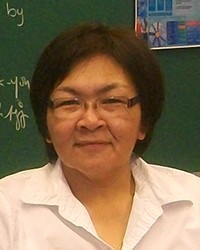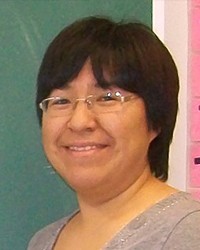|
UQAT is proud to be involved in this partnership.
UQAT (ᐅᑳᑦ) ᑯᐯᒃ ᐊᐱᑦᓯᐱ ᑎᒥᓴᑲᒣᖕᓗ ᐃᓕᓴᕐᕕᔪᐊᖕᒐ ᐊᐱᒍᓱᒻᒪᕆᑉᐳᑦ ᐱᓇᓱᕐᑲᑎᕐᑲᕆᐊᒻᒥᒃ ᐃᓕᑦᓯᓂ.
UQAT Kupait apittipi timiskaminglu Ilisarviyuangna upigusummaripput pinasuqatiqariaamik Ilitsinik. |
|
Presentations from the IPUIT conference held in Puvirnituq in November 2015. For more details: 2015 IPUIT |
|
|
School Success in Puvirnituq and Ivujivik schools, Nunavik
SCHOOL SUCCESS IPUIT 2015 from Tukisivallirutitsanut Parnaitiit on Vimeo |
|
|
Inuktitut curriculum in Puvirnituq and Ivujivik schools, Nunavik
INUKTITUT CURRICULUM IPUIT 2015 from Tukisivallirutitsanut Parnaitiit on Vimeo |
|
|
Teacher Training in Puvirnituq and Ivujivik schools, Nunavik
TEACHER TRAINING IPUIT 2015 from Tukisivallirutitsanut Parnaitiit onVimeo |
|
|
School, parents and community partnership in Puvirnituq and Ivujivik schools, Nunavik
SCHOOL, PARENTS AND COMMUNITY PARTNERSHIP 2015 from Tukisivallirutitsanut Parnaitiit on Vimeo |
|
URFDEMA
Created in 1990 by the Educational Sciences Teaching and Research Unit of the Université du Québec en Abitibi-Témiscamingue (UQAT), URFDEMA supports various community-based projects in education. Its activities fall into three main areas of interest: the role and aims of community schools, school curriculum development, and support for learning and developing a mother tongue language.
Together with representatives of Puvirnituq and Ivujivik schools, as well as Kativik Ilisarniliriniq, URFDEMA supports professional training of Inuit teachers in these two communities. Courses are offered for undergraduate certificate programs in preschool and elementary school teaching in northern communities, and are available in both of the above communities, not only to teachers but also to other educational human resources, school principals, and pedagogical counsellors. The programs are managed through a community-university partnership. In addition, professor working in URFDEMA lead research and development activities on school curriculum, teacher training, language contact (diglossia), literacy development, and use of information and communication technologies (ICTs) in Indigenous contexts.
[URFDEMA has chosen to spell the word Inuit without an ‘s’ in the plural form because this word is already plural in Inuktitut. For further information on this subject, see: Dorais, L.-J. (2004). Rectitude politique ou rectitude linguistique? Comment orthographier « Inuit » en français. Études/Inuit/Studies, Vol. 28 (1), 155-159.]
Our team
Curent UQAT team :
- Glorya Pellerin, professor, Firt Nations teacher training program manager and head of URFDEMA
- Lily Bacon, professor, First Nations teacher training program manager
- Gisèle Maheux, associate professor, program manager from 1990–2005 and 2008-2009
- Véronique Paul, professor and Inuit teacher training program manager
- Virginie D. de la Chevrotière, research officer
- Sylvie Tanguay, executive secretary
[URFDEMA team in coming]
Co-management group Ivujivik-Puvirnituq-UQAT

Top: Virginie D. de la Chevrotière, research agent; Véronique Paul, professor and Glorya Pellerin, URFDEMA program manager
Bottom: Sarah Angiyou, teacher and Lucy Qalingo, Ikaarvik School principal (Puvirnituq); Passa Mangiuk and Michelle Audlaluk, teachers(Ivujivik)
Absent in photo: Elisapi Uitangak, pedagogical counsellor and Evie Sivuarapik and Marie-Carole Qinuajuak, teachers (Puvirnituq); Siaja Mangiuk and Michelle Audlaluk, teachers (Ivujivik); Sylvie Tanguay, executive secretary (UQAT)
Inuit members of the co-management group of certificate programs for Inuit teachers
-
Elisapi Uitangak, Pedagogical counsellor - Ikaarvik

-
Lucy Qalingo, - Ikaarvik

-
Siaja Mark, Teacher - Nuvviti

-
Passa Mangiuk, Teacher - Nuvviti

-
Sarah Angiyou, Teacher - Ikaarvik

Our history
Birth of a partnership
[IPUIT: acronym that means “Ivujivik and Puvirnituq school committees”. In Inuktitut, IPUIT also means the “handle” of a tool. In this sense, the school as an institution is a tool for personal and collective development.]
The underlying partnership principle of the collaboration between educational human resources of the communities and URFDEMA resources is based on values of equality, interdependence, and dialogue.
In 1984, the school committees [IPUIT] asked UQAT to help them develop their project to take over education in their communities. The communities wished to set up a school that would help maintain their cultural identity while enabling students to gain the knowledge and skills they need for life in today’s society. To clarify and implement the project, several meetings were held between, on the one hand, the IPUIT representatives, the school principals, and the pedagogical counsellors and, on the other, some university professors. A process and mechanism for joint management of teacher training activities was created at the explicit request of the Inuit partners, who wanted this cooperation to respect their community’s desire to define the aims of their school and develop education for community needs. The two groups of partners, i.e., the Inuit and the university-based trainers, are equal in status and interdependent. This is one of the founding principles of the partnership, and recognizing this principle is key to the success of any activity.
This partnership project gradually developed over time and gave rise to URFDEMA, which is integral to Educational Sciences Teaching and Research Unit at UQAT.
The experience described on this website involves partners who have developed a very special working relationship around a project to support and develop education in three Nunavik schools (Ikaarvik and Iguarsivik in Puvirnituq; Nuvviti in Ivujivik). This project exists and continues to exist through the commitment, patience, and perseverance of its partners’ leaders.
All of this has been possible because academics and educational Inuit resources have been open to new ways of doing, organizing, managing, and intervening in training, development, and research projects. They have been available to each other on a sustained basis despite the distance between them, and UQAT has flexibly and openly applied its administrative standards and procedures.
After more than 30 years of working in partnership, and constantly creating favourable conditions and work routines between the partners, we can speak of a truly collaborative practice. Through this unique experience based on mutual respect and openness to each other’s culture, links have been forged, and a deep-seated belief in the project’s importance has been established on both sides.
How our work approach is handled through the Ivujivik-Puvirnituq-UQAT- partnership.
The approach to the project is essentially one of dialogue between partners who come from different cultures and have different forms of knowledge. The differences are not only in the type of knowledge but also in the way it is used. On the one hand, the Indigenous partners are carriers of knowledge gained through experience and convey the culture of their community. On the other, the university partners are bearers of Western scientific knowledge. During exchange and dialogue between these two types of knowledge, one should take into consideration the identity-based and cultural difference between the two groups of partners both in theory and in practice.
A perspective of co-construction of teachers' knowledge
This approach has two key foundations: 1) bringing together theory and practice; and 2) dialogic educational practice (Leclerc, 2000). Knowledge is elaborate through interaction, and students learn via educational situations and the experience they have with them. In this context, dialogic practice becomes a way of being and acting. It is the way a trainer relates to one or more students so that they may learn course content that everyone deems essential.
Creating knowledge together begins with information being communicated about the context and content of a training activity. The two groups of partners further clarify the actual course content, the students’ relationships with this content, and the community’s relationship with what this content means to its members. This process has two basic principles and components: 1) recognizing the differences in cultural identity of everyone involved and 2) recognizing the presence of two cultural heritages, i.e., two forms of knowledge.
The approach to training is based, among other things, on what the students know from experience. The partners contribute by explaining and communicating their cultural reality. They must ensure that the academics understand the distinctive features of the school and the community contexts. As for the academics, they bring expertise in development of education to a remote rural region with low population density—a specialty of universities in outlying regions of the Université du Québec network—and expertise in development of education in a context of diglossia.
The co-management group of Inuit teacher training programs
A group of educational human-resource from Puvirnituq and Ivujivik’s community schools and professors and professionals from Educational Sciences Teaching and Research Unit at UQAT have developed a mechanism and structure for jointly managing and delivering Inuit teacher training programs. This co-management dynamic makes possible the regular meeting of the partners for more than 30 years and is the driving force for the development of the educational project of the communities.
The co-management group plan, implement, and assess teacher training activities. Once a month, or more often when needed, the co-management group meets by phone or video-conference. Project partners from the university and from the communities come together to plan, carry out, and assess teacher training activities in the community schools. The co-management process is the most formal part of this working relationship. The partners mainly discuss the programs, the actual training activities, and the development and management of these activities. The language of communication is English—the second language of both groups of partners. Partners understand and conceptualize educational situations and course content in their own language, i.e., French and Inuktitut. Because they live and work far away from each other, they have developed effective means of communication from a distance, including video conferencing.